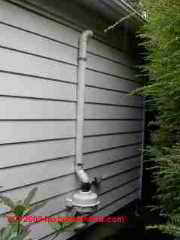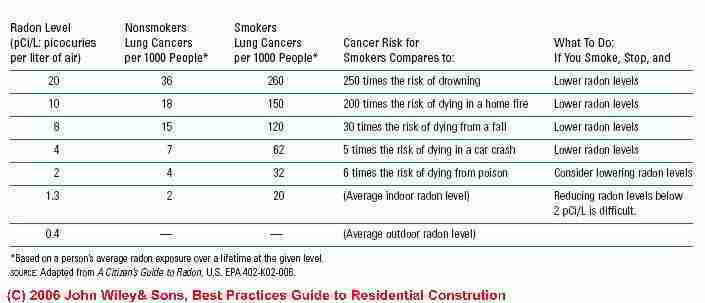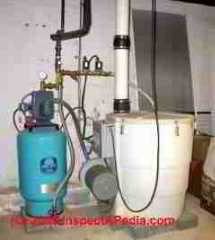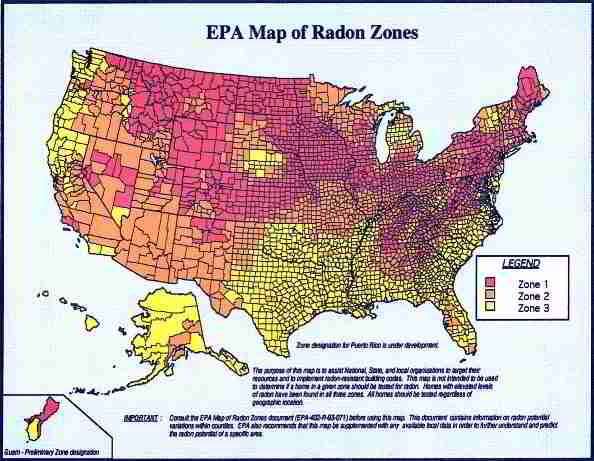 Radon Hazard & Remediation Guide
Radon Hazard & Remediation Guide
- POST a QUESTION or COMMENT abour radon gas harzards in buildings: the risks, the effect on real estate values, and the remedies for a radon problem.
Radon gas hazards in buildings: What are the health effects of radon, how should radon levels be measured, and what are the best steps to correct unsafe indoor radon gas levels in buildings..
This article includes a review of the impact of radon gas contamination levels in air or water on real estate sales and property values. We include a table of risks comparing radon to other health and safety hazards and we provide links to eight detailed articles that will accurately and fully inform you about radon gas, the risks, and the remedies.
InspectAPedia tolerates no conflicts of interest. We have no relationship with advertisers, products, or services discussed at this website.
- Daniel Friedman, Publisher/Editor/Author - See WHO ARE WE?
Radon Hazards in buildings: Radon Health Effects, Radon Measuring, Radon Remediation Procedures
Radon is a colorless, odorless gas released from the breakdown of uranium and radium, which is found in rocks and soil and sometimes in water. The gas enters the house primarily through cracks and gaps in the foundation, floor drains, and sumps, and concentrations build up indoors.
Radon can also enter the home through well water and be released during showering or other uses. In rare cases, it is found in masonry building materials. Radon is thought to be the second leading cause of lung cancer in the United States, after smoking (Table 7-6).
Radon is drawn into buildings by the stack effect and by depressurization from mechanical equipment. During warm weather when the stack effect is reduced and buildings are often well-ventilated, indoor radon levels are usually one-third or more lower. Also, levels in the basement are typically over twice the level on the first floor.
Article Contents
- RADON HAZARD TESTS & MITIGATION
- HEALTH EFFECTS of exposure to radon gas in homes - a consumer summary
- TABLE of RISK LEVELS of Lung Cancer Risk from Exposure to Radon
- RADON IN WATER - risks from radon exposure in water
Health Effects of Exposure to Radon
Radon gas breaks down into short-lived decay products that can be inhaled either unattached or attached to other particles in the air and penetrate deeply into the lungs. According to its 2003 Assessment of Risks from Radon in Homes, the EPA estimates that radon causes about 20,000 lung cancer deaths annually in the U.S.
This makes radon the second leading cause of lung cancer in the United States, where an estimated 1 out of 15 homes has elevated levels. The cancer typically occurs 5 to 25 years after exposure, and the risk goes up dramatically if the person is also a smoker (see Table 7-6, Lung Cancer Risk from Radon Exposure, below).
Lung Cancer Risk from Exposure to Radon

Levels of Radon in Drinking Water

While much less of a problem than airborne radon, radon in water is also a concern. If indoor radon levels are high and the household uses well water, the water should also be tested. In general, every 10,000 pCi/L of radon in household water contributes about 1 pCi/L (picocuries per liter) of radon to indoor air level.
The radon gas is released from the water when it is aerated during showering, washing dishes, or laundering. There also may be an increased risk of stomach cancer from swallowing the water.
According to the Centers for Disease Control, ventilating bathrooms, kitchens, and laundry rooms is usually adequate to reduce risks from radon in water.
However, where water levels are high, the radon can be removed by aeration treatment or carbon filtering.
-- Adapted with permission from Best Practices Guide to Residential Construction (Steve Bliss, J Wiley & Sons) .
See RADON ENVIRO-SCARE for a full discussion of the normal cycle of public fear that accompanies the discovery and publicity of various environmental hazards, including radon gas and see ENVIRO-SCARE, the Cycle of Public Fear for our article about consumer environmental safety worry cycles that change over time.
This article series includes excerpts or adaptations from Best Practices Guide to Residential Construction (Steve Bliss, J Wiley & Sons) , by Steven Bliss, courtesy of Wiley & Sons.
Radon Gas Hazard PDFs
For a thorough background in Radon Hazards, Radon Mitigation, & the History of Radon Concerns in the U.S. also see these articles reprinted/adapted/excerpted with permission from Solar Age Magazine - editor Steven Bliss.
- RADON'S THREATCan Be Subdued, PART 1 - [PDF] William Turner, Terry Brennan, Solar Age Magazine Radon and its progeny are the slipperiest pollutants in the indoor environment, but there are simple ways to keep radon and its relations at bay.
- RADON'S Threat Can Be Subdued, part 2 - [PDF] what is radon, where does radon come from, how does radon get indoors, and why is radon a problem in buildings.
- RADON'S Threat Can Be Subdued, part 3 - [PDF] standards for airborne radon levels in buildings and recommended levels of radon for action, how radon is best detected, and radon action plan.
- RADON'S Threat Can Be Subdued" part 4 - [PDF] radon prevention advice for new construction, radon in well water - how it is removed, sources of information about radon gas and radon contamination.
- DEFEATING Radon part 1 - [PDF] Terry Brennan, Bill Turner, Solar Age Magazine - How does radon get into buildings, how do I know if a building has a radon gas problem, how can I solve radon problems in existing homes, and what can I do to prevent radon from entering new homes. Part 1: where Radon comes from, how to diagnose radon
- DEFEATING Radon part 2 - [PDF] Guide to keeping radon out of new houses - design details
- DEFEATING Radon part 3 - [PDF] Key spots to seal, to stop radon gas leaks into buildings
- DEFEATING Radon part 4 - [PDF] Data on radon levels in buildings before & after radon mitigation treatment
- DEFEATING Radon part 5 - [PDF] Air filtering, testing after radon mitigation, where to buy radon tests
- Radon Gas, U.S. EPA Radon level maps, web search 2005, original source: epa.gov/iaq/radon/zonemap/zmapp33.htm
...
Continue reading at RADON HAZARD in UNDERGROUND HOMES or select a topic from the closely-related articles below, or see the complete ARTICLE INDEX.
Or see these
Recommended Articles
Suggested citation for this web page
RADON HAZARD TESTS & MITIGATION at InspectApedia.com - online encyclopedia of building & environmental inspection, testing, diagnosis, repair, & problem prevention advice.
Or see this
INDEX to RELATED ARTICLES: ARTICLE INDEX to BUILDING INDOOR AIR QUALITY IAQ
Or use the SEARCH BOX found below to Ask a Question or Search InspectApedia
Ask a Question or Search InspectApedia
Questions & answers abour radon gas harzards in buildings: the risks, the effect on real estate values, and the remedies for a radon problem. .
Try the search box just below, or if you prefer, post a question or comment in the Comments box below and we will respond promptly.
Search the InspectApedia website
Note: appearance of your Comment below may be delayed: if your comment contains an image, photograph, web link, or text that looks to the software as if it might be a web link, your posting will appear after it has been approved by a moderator. Apologies for the delay.
Only one image can be added per comment but you can post as many comments, and therefore images, as you like.
You will not receive a notification when a response to your question has been posted.
Please bookmark this page to make it easy for you to check back for our response.
IF above you see "Comment Form is loading comments..." then COMMENT BOX - countable.ca / bawkbox.com IS NOT WORKING.
In any case you are welcome to send an email directly to us at InspectApedia.com at editor@inspectApedia.com
We'll reply to you directly. Please help us help you by noting, in your email, the URL of the InspectApedia page where you wanted to comment.
Citations & References
In addition to any citations in the article above, a full list is available on request.
- RTCA, the Radon Testing Corporation of America, is in Elmsford, NY - 800-457-2366
- US EPA Radon level maps for the United States (747 K PDF file) - US EPA data on radon risk by geographic area - original source http://www.epa.gov/radon/zonemap.html
- Granite Countertops and Radiation Hazards, U.S. EPA (PDF), retrieved 12/15/2010, original source: http://www.epa.gov/rpdweb00/tenorm/granite-countertops.html
- Best Practices Guide to Residential Construction, by Steven Bliss. John Wiley & Sons, 2006. ISBN-10: 0471648361, ISBN-13: 978-0471648369, Hardcover: 320 pages, available from Amazon.com and also Wiley.com. See our book review of this publication.
- In addition to citations & references found in this article, see the research citations given at the end of the related articles found at our suggested
CONTINUE READING or RECOMMENDED ARTICLES.
- Carson, Dunlop & Associates Ltd., 120 Carlton Street Suite 407, Toronto ON M5A 4K2. Tel: (416) 964-9415 1-800-268-7070 Email: info@carsondunlop.com. Alan Carson is a past president of ASHI, the American Society of Home Inspectors.
Thanks to Alan Carson and Bob Dunlop, for permission for InspectAPedia to use text excerpts from The HOME REFERENCE BOOK - the Encyclopedia of Homes and to use illustrations from The ILLUSTRATED HOME .
Carson Dunlop Associates provides extensive home inspection education and report writing material. In gratitude we provide links to tsome Carson Dunlop Associates products and services.


